
Elden Ring Review
In many ways, Elden Ring is not a novel concept or even a fresh idea. Saddling up and galloping full speed into the Lands Between felt like the same fond wistfulness you get when revisiting a familiar college library or an old childhood hangout, despite it being a new IP. Within a few hours of booting the game up, I felt the faint nostalgia and muscle memory of 2016's Dark Souls 3 out of so many aspects of Elden Ring's worldbuilding, audio design, and gameplay trappings (I'm still calling Sites of Grace "bonfires").
It's impossible to talk about Elden Ring without also mentioning Dark Souls, especially since within the soulslike genre that FromSoftware has shepherded over the last decade-plus, Elden Ring doesn't even have as much of a unique flavor to it compared to Bloodborne or Sekiro. In many ways, Elden Ring feels more like a straight Dark Souls game than I ever expected it to.
However, while it is maybe not inventive or brimming with new ideas, Elden Ring more than makes up for it by still being possibly the most ambitious RPG that I've ever played. Instead of bringing forth clever new forms of gameplay or a more imaginative narrative premise, FromSoftware has instead decided to polish their format to a mirror shine, and extend the boundaries of what this kind of game can offer by fitting it into the framework of a more conventional open-world foundation. The result is a masterful experience that kept exceeding my expectations regardless of how familiar it appeared to be at its surface.
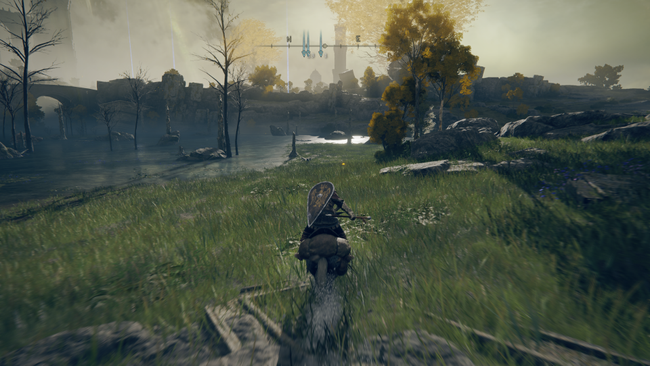
Even the opening premise of Elden Ring is not too dissimilar from that found in most of FromSoftware's catalog. A once blessed land finds itself in seemingly endless conflict as the demigod offspring of Queen Marika fight over shards of the shattered Elden Ring, all while various other Tarnished vie and wrestle to make their own space amongst the chaos and dissent. The narrative is both surprisingly straightforward at its core while also being unsurprisingly dense and open to interpretation in many respects. While much of the specific meaning of particular lines or lore will need to be analyzed and pieced together over the coming months, there is enough clever storytelling here even for players who don't delve into reading item descriptions or scouring environmental clues.
While a lot of the story particulars could easily be missed on a single playthrough, Elden Ring does still smartly execute enough intrigue with the way it exposes its world and inhabitants to the player, even for those not seeking to absolutely piece together everything at once. Certain environments are incredibly evocative, especially late in the game, alongside the steady uneasy progression of NPC dialogue as the consequences of the player's actions become more clear. These slight and understated hints manage to deliver a clear sense of story progression despite never railroading the player to a specific path or inundating them with many cutscenes at all. Little clues slowly come together to explain why the world is called the "Lands Between", and it's quite a feat how effectively and efficiently Elden RIng is able to convey the premise of its narrative all in the interest of designing a game with an absurd level of player freedom.
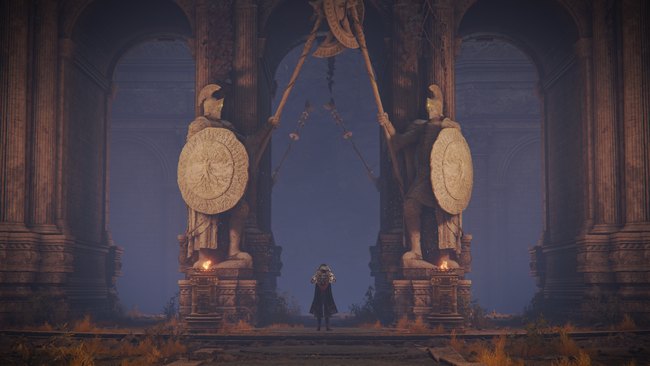
It is constantly astonishing just how much is packed into the Lands Between. After a brief story introduction and tutorial, players will immediately find themselves in the lush region of Limgrave. From here, the whole world is literally open to explore. Many of us are familiar with the option of traveling either to the Catacombs or Undead Burg at the outset of Dark Souls. While neither option is explicitly directed to the player, one path is suggested over the other in terms of how difficult it is to manage just starting out, versus revisiting the other once you've made some headway and become a bit stronger.
Well, Elden Ring is that very same experience, over and over, constantly throughout the entirety of my runtime with the game, and never letting up. While there is often a suggestion of a direction to head and a task in mind, there are so few barriers limiting players on what to do, where to go, and what they should seek to accomplish. If the phrase "open-world" has developed a negative stigma of referring to giant empty maps with nothing to see but repeated copy-paste content between swathes of emptiness, then Elden Ring's world is a wholesale rebuttal of that perceived reputation. During my time with Elden Ring, I constantly found myself distracted, and then distracted from my distractions, simply because I was never free from finding another secret path, or challenging myself to explore further reaches of the map, or heading past the next major fork in the road to see where it would lead.

Even when a certain path is suggested either through an infrequent cutscene or the suggestion of an NPC, very little actually truly gates the player completely. For instance, in order to reach a later region of the map, I was tasked to find two parts of a medallion in order to activate a giant lift that would carry me to my destination. Instead of exploring around to find these key items, I instead found a path up the same cliffside by climbing a bunch of scaffolding and trekking through a large mine, complete with a seemingly optional boss encounter, that eventually led me to the same place. I would later learn that by bypassing the lift entirely, I completely sidestepped an entire region of the map unknowingly.
I would later learn after this that it is entirely possible to skip the game's first major dungeon-like experience, Stormveil Castle, with a little bit of sleuthing about. I would call it a sequence break, but it feels 100 percent the intended design of the area as a sort of reward for diligently exploring. It's crazy to think about how much is packed into this world and how the majority of it might very well be optional.
One final thing to mention about the open world and freeform nature of the game is, of course, the spectral steed Torrent. Unfortunately, while riding on horseback feels fast and fluid as a traversal tool across the map, I never really found myself eager to engage with horseback combat. While only a few enemy encounters are expected to be fought while mounted, these never felt like highlights of the game, and coming out victorious didn't feel nearly as thrilling as finally overcoming a more standard boss attempt on my tenth try. Those with ranged or magic capability might find some of the combat here to be trivial, but I often found myself wishing that I was just able to fight on foot instead.
Beyond the horseback combat, the only similar nitpick that I had about the combat was a propensity for several enemies to use ranged attacks in certain areas, often with homing characteristics. While these can be learned to be dealt with, I found it just slightly frustrating to have to frequently avoid incoming magic missiles, Shrine of Amana style.
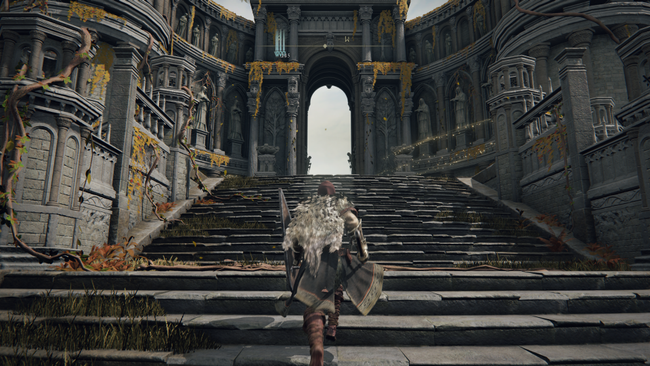
There are a couple of aspects of Elden Ring's open-world design that are a little bit more conventional. The map itself is dotted with icons that denote landmarks such as churches, city ruins, cave entrances, and so on. Usually, each of these areas will have at least one thing of interest that makes it worth exploring. Sadly a small number of these landmarks are disappointingly paltry, often leading to a single room with a treasure chest or to a minor mini-boss to reward some sort of weapon. However, a nondescript cave entrance is equally likely to lead to a whole string of interconnected catacombs or tunnels that constantly found me spoiled for choice on what task to take on next. Sometimes, a missed cave entrance would literally lead me to a region of the map that I previously had no idea how to access.
In fact, there is a little bit of inherent (but good) frustration with the amount of freedom levied on the player in this aspect of the game. For instance, as a spellcaster, I failed to learn any new sorceries within the first 8 or so hours of gameplay simply because I happened to not explore the right places in the right order. At the same time though, I was able to later in the game find a legendary sorcery just by happenstance, and it turns out that this would help carry me through several of the endgame bosses.
Similarly, sometimes upon backtracking through a region I had thought that I had already explored, I would stumble upon a place that I could have explored ages earlier but had inadvertently avoided. The lack of a designated path means there's a little bit of flexibility required in terms of being able to break with an established plan. In my case, I ended up forgoing my magic build for a little bit of a hybrid mage-knight due to the lack of spells that I had come across. In this way, there's a little bit of emergent gameplay design built in. Naturally, this means that players that love to explore thoroughly and comb every corner in every region should find themselves absolutely enamored.
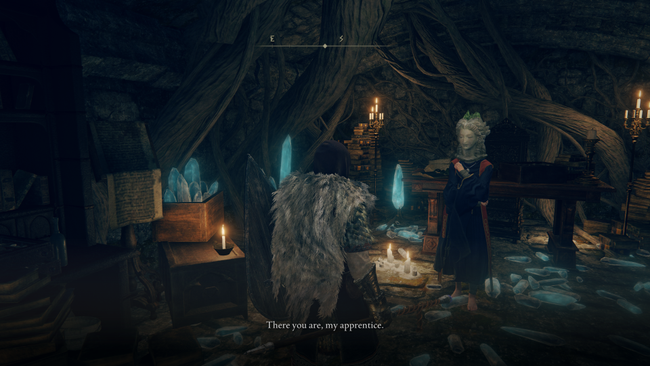
Another incentive to explore the reaches of the map beyond simply testing your mettle or sheer wanderlust is the number of inhabitants of the world that will often ask for aid. Dotted across the land are numerous NPCs of various dispositions. While Elden Ring may have incorporated a map to account for the new open-world design, there is still no specific quest log to track these encounters, so carrying out many of these tasks will often require a keen eye or even a good memory. While the occasional request will mark a quick note on your map, NPC's will often refer to regions and landmarks, and require the player to navigate from a verbal description, rather than a quest log entry and a waypoint.
As should be expected, a lot of the criteria for these tasks are often left vague and it's never quite clear whether an encounter with an NPC should be expected again or not. Oftentimes I found myself planning to come back across a character later in my travels only to never meet them again. At the same time, I would sometimes return to a character that I hadn't spoken with in hours only to find that they had new dialogue for me and often some sort of reward or at least a bit of story that details their specific background. While Elden Ring doesn't often put the story in the foreground of the player experience, the number of NPCs that provide lived-in context to the world help to really establish a sense of history and provide context to the few scenes or lead-up to the major boss encounters.
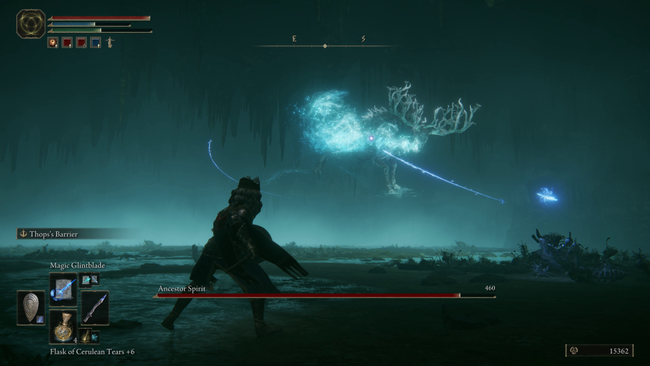
Speaking of boss encounters, I have never seen the familiar red-bar UI fill the bottom of my screen as often as I have in Elden Ring. The variety of bosses from hulking beasts to nimble footsoldiers and magical creatures constantly had me adjusting my strategy and approach. Just like so many of the regions of the game, many of the boss challenges as well are seemingly optional. For instance, I encountered at least 4 named dragons while on horseback across the Lands Between, and haven't gone back to fight many of them. There's even a sort-of gimmicky event boss that vaguely reminded me of Demon's Souls Dragon God, only not nearly as awkward. Other bosses had me learn how to deal with magic, bleed buildup, perfect my timing, or find a useful set of consumables to craft to give me just a little edge.
Lastly and disappointingly, during my time with the PC version of the game, I did encounter a seriously annoying stutter and a number of framerate drops -- typically as it seemed like the game was transitioning me to a new area or loading new assets behind the scene. Since my playthrough, a new patch (game version 1.02) seems to have improved the issues somewhat, but certain slowdowns still persisted. Hopefully these are issues that can be sorted out shortly after launch, because they were easily the largest single detraction of my time with the game.
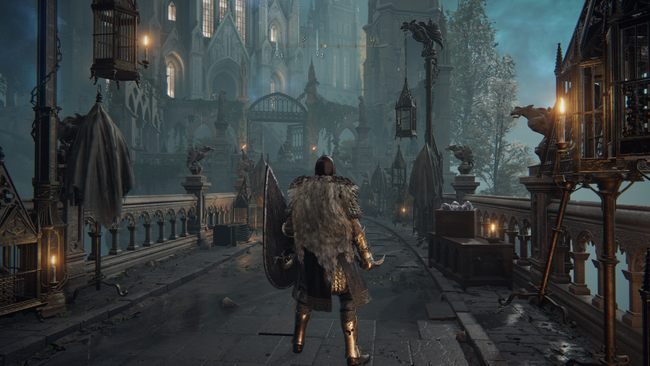
After having finished my first playthrough of Elden Ring. I immediately want to play it again. I have never experienced that with an open-world game before - usually, I find myself thankful such behemoth games are over. FromSoftware has managed to nimbly incorporate its deliberate and challenging action RPG gameplay into an open world with a huge sense of freedom. The fact that they accomplished this feat without compromising on difficulty or narrative is a true marvel. Managing to also avoid almost all of the pitfalls of conventional open-world design is a step beyond even that. Even if you're fatigued over the familiar trappings of dark fantasy soulslike games in particular, Elden Ring is a masterful refinement of the formula that is the current zenith of its form - and it deserves glowing recognition.